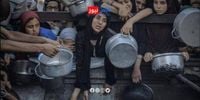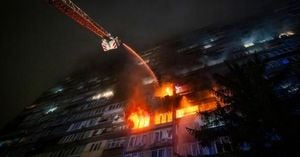As the 82nd Venice Film Festival prepares to roll out its red carpet on August 27, 2025, a different kind of spotlight is illuminating the storied event. This year, hundreds of Italian and international cinema professionals, including prominent directors Marco Bellocchio, Alba Rohrwacher, and Matteo Garrone, have united under the banner of Venice4Palestine (V4P), urging the festival’s organizers to acknowledge the ongoing humanitarian crisis in Gaza. Their open letter, which has drawn support from filmmakers, actors, and cultural figures across Europe and the Middle East, calls for the festival and its parent body, the Biennale, to take a clear and courageous stand against what they describe as the ongoing genocide and ethnic cleansing in Palestine by the Israeli government and army.
The letter’s opening line, “Stop the clocks, turn off the stars. The burden is too much to carry on living as before,” sets a somber tone, reflecting the anguish felt by many in the global arts community. The signatories, who include French director Audrey Diwan, actor Swann Arlaud, Bulgarian filmmaker Kostantin Bojanov, Iranian-French director Sepideh Farsi, UK actor Charles Dance, and Palestinian directors Arab Nasser and Tarzan Nasser, argue that the world can no longer look away from the suffering in Gaza and the West Bank. “No one will ever be able to say: ‘I couldn’t know, I couldn’t imagine, I couldn’t believe’,” the letter insists, referencing the harrowing images and stories emerging from the region over the past two years.
The timing of this call to action is deeply symbolic. The festival’s opening comes just six weeks before the third anniversary of the Hamas attacks on southern Israel, which killed 1,200 people and resulted in 251 hostages being taken. In the aftermath, Israel launched a military campaign aimed at dismantling Hamas and freeing the hostages—a campaign that, according to figures cited by Deadline, has left at least 61,000 people in Gaza dead. The Israeli government has pushed back against accusations of genocide, calling them “baseless” and maintaining that its actions lack intent to destroy a people, as required by the legal definition of genocide.
The humanitarian impact, however, is undeniable. The United Nations-backed Integrated Food Security Phase Classification (IPC) announced this week that half a million people in Gaza are now facing a “man-made” famine, with at least 132,000 children under five expected to suffer from acute malnutrition. Hospitals in Gaza are reporting a rising number of deaths due to starvation and malnutrition, as over two million people struggle with severe food shortages. More than a hundred NGOs have sounded the alarm about the “spreading famine” and the desperate conditions on the ground.
In their letter, the V4P signatories assert that Israel’s persecution of Palestinians predates the October 7 attacks by decades, citing a history of “ethnic cleansing, apartheid, illegal occupation of Palestinian territories, colonialism and all the other crimes against humanity committed by Israel for decades.” They argue that the Venice Film Festival, as a global cultural event, has a responsibility to bear witness and speak out. “As the spotlight turns on the Venice Film Festival, we’re in danger of going through yet another major event that remains indifferent to this human, civil, and political tragedy. ‘The show must go on,’ we are told, as we’re urged to look away—as if the ‘film world’ had nothing to do with the ‘real world’,” the letter proclaims.
The call for action is not limited to the festival’s organizers. A broader open letter, signed by more than 500 figures from Italy’s cultural sector—including cinema personalities Valeria Golino and Gabriele Salvatores—has called for a day of mobilization in support of Palestine during the festival on August 30. This groundswell of support comes as international condemnation of Israel’s military operations in Gaza grows and as Israel’s recent approval of a controversial settlement project threatens to further isolate the occupied West Bank from East Jerusalem.
Meanwhile, the diplomatic front remains fraught with tension and deadlock. Since July 6, delegations from Qatar, Egypt, and the United States have been engaged in shuttle diplomacy between Israeli negotiators and Hamas in an effort to broker a truce after more than 21 months of war. Yet, as reported by Al Jazeera, these negotiations are at a stalemate. A two-month truce earlier this year ended without lasting resolution, and both sides remain entrenched in their demands: Israel insists on the destruction of Hamas and control over Gaza, while Hamas calls for a permanent end to the war and the withdrawal of Israeli troops.
The current proposal on the table reportedly includes a 60-day ceasefire and the release of 10 live Israeli hostages in exchange for hundreds of Palestinian prisoners. However, analysts see little hope for a breakthrough without significant external pressure. Karim Bitar, a lecturer at Sciences Po Paris, told Al Jazeera, “The bitter reality is that for reasons of domestic politics, neither Israeli Prime Minister Benjamin Netanyahu nor the Hamas leadership in Gaza have an interest in a quick resolution and a total ceasefire,” adding that “both sides will face serious questions from their own constituents.”
Andreas Krieg, a Middle East analyst at King’s College London, points out that the proposal is “just a new prisoner exchange deal, not a real ceasefire agreement.” He notes that Hamas faces a dilemma: it is under immense pressure to secure concessions from Israel to alleviate the humanitarian crisis, but it must also avoid the appearance of political capitulation. “Humanitarian pressure is increasing rapidly,” Krieg observes, suggesting that the dire situation on the ground could force Hamas to accept a temporary deal, even if it falls short of their long-term goals.
Complicating matters further are technical and communication difficulties between Hamas’s military leadership in Gaza and negotiators in Doha, which have hampered previous efforts to reach an agreement. Bitar warns that this round of talks could fail like those before, “unless the United States and Qatar significantly increase pressure on Israel.”
Against this backdrop, several Western nations—including France, Britain, Canada, and Australia—are reportedly preparing to recognize a state of Palestine at the upcoming United Nations meeting in September 2025. This move, if realized, would mark a significant shift in international policy and could add new momentum to diplomatic efforts, though its impact on the ground remains uncertain.
As the Venice Film Festival approaches, the intersection of art, politics, and humanitarian advocacy has seldom felt more urgent. For many in the film world, the question is no longer whether to engage, but how to use their platform to bear witness and demand change. The festival’s response—and the world’s—will be closely watched in the days and weeks to come.




